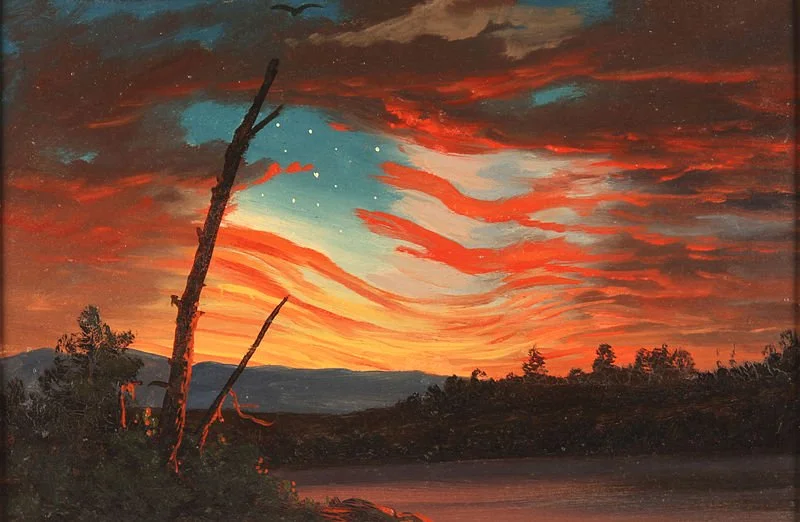I never imagined that I’d be introducing a project so dear to my heart with a card as dismal as the Ten of Wands. But then, I never imagined that Donald Trump would be elected President of the United States. One of the fun things about creating a Tarot deck is watching for the synchronicities that arise when you are deeply engaged in replicating the energy of an archetype. Celeste began drafting the Ten of Wands in the summer of 2016, but there were elements of the image that simply refused to come together until the onerous weight of the election results were upon us.
Our Banner in the Sky, by Frederic Edwin Church, 1861
Like many of you, perhaps, I at first cycled through the five stages of grief as I contemplated the total destruction of the America I loved. Every American institution I take pride in is on Trump’s chopping block. But then I realized that this project I’ve been immersed in the last several years, The American Renaissance Tarot, provides me with the perfect platform to champion those values that I hold so dear, what I will venture to call real American values. Things like diversity, equality, and freedom of expression. In spite of its shameful history of colonization, genocide, and slavery, America also has a rich history of philosophical inquiry, metaphysical experimentation, and cultural syncretism. These are the traditions that I believe are worth memorializing as part of our shared cultural inheritance. And if I was seeking an exemplar of a writer who was socially progressive (for the nineteenth century) in addition to being a paragon of American intellectual ingenuity, I could certainly do worse than Herman Melville. Thus we begin: try to find something to hold onto as we dive into the Ten of Wands, an ode to the final scenes of Moby-Dick.
The Ten of Wands in the Rider-Waite-Smith Tarot
In the Rider-Waite Tarot illustrated by Pamela Coleman Smith, the Ten of Wands depicts a man employing all his force toward moving a heavy bundle of sticks. The traditional interpretation is “stress,” and the card usually signifies that the querent is entering a period of weighty responsibility and facing real-life demands. After Trump was elected, I thought, There is so much work to do. We cannot sleep, because in a wink the basic rights of women, LGBT individuals, immigrants, and racial and religious minorities could all be erased, and with them the right to peacefully dissent. We must be vigilant; we must “stay woke.”
The Ten of Wands for The American Renaissance Tarot depicts Ishmael from Melville’s Moby-Dick watching the Pequod and all its crew sink into a churning ocean vortex. He has found his companion Queequeg’s empty coffin, and will survive the ordeal of shipwreck by holding fast to it for an entire day, fearing hunger, thirst, exposure, and the predations of sharks and sea-hawks. To stay alive he must become hyper-aware of his own position and every threat that lurks from above, below, and the periphery. There is no respite from this feat of mental and physical exertion; that is the feel of the Ten of Wands.
Detail of Ishmael from the Ten of Wands
Detail of Captain Ahab from the Three of Wands
If Ishmael’s plight captures the mood of the Ten of Wands, the sinking of the Pequod is its cautionary tale. The mad despot, Captain Ahab, steers an ethnically diverse crew of Americans into perdition, so hell-bent is he on his quest to seize the dumb and brutal whiteness of Moby-Dick. Rather than hunt the sperm whale for oil and profit, as both captain and crew have pledged to do, Ahab commandeers the ship for the purposes of enacting his own petty vengeance. Melville’s comparison of the floating world of the Pequod to America is hardly subtle; in the final chapter, Ahab commands Tashtego, a Native American, to nail the national flag to the mast of the rapidly sinking ship. In the ensuing chaos, the wing of a bird of prey becomes nailed to the mast as well, and this bird is often understood to be an eagle. Thus the Pequod as microcosm of America, with its crew of Native Americans, African Americans, European Americans, and other immigrants, becomes martyred to the cause of a malignant whiteness. The white whale Moby-Dick charges headlong into the body of the ship, causing the wreck, a sacrifice of thirty men orchestrated by Captain Ahab’s senseless obsession.
Detail of the eagle from the Ten of Wands
In the Ten of Wands, the fires of ego have raged out of control. Ahab’s megalomaniacal vision might make for some compelling monologues in Moby-Dick, but to be subject to his irrational will is oppressive. Aleister Crowley in The Book of Thoth takes a dire view of the Ten of Wands, writing of the “blind force” of ego which leads ultimately to “a stupid and obstinate cruelty.” Though more comforting insights might be taken from the Ten of Wands (and for those you will need to read my chapter on this card), the point of this blog post is to underscore Melville’s prescience in calling attention to the toxic preoccupation with whiteness, all the way back in 1855. There’s nothing wrong with being white, of course, the problem is rather that the social construction of whiteness has typically rested on the construction of black and brown bodies as inferior and radically Other. One of my many purposes in creating this project has been to illustrate the diversity of American voices which have been a part of this country since its colonial period, and this breadth of perspective is something Herman Melville performs exceptionally well in Moby-Dick. And so I say to Mr. Trump: learn something from Ahab’s mistakes. The quest for the elusive whiteness will sink the American ship.
Thea
Detail of Moby-Dick from the Ten of Wands








